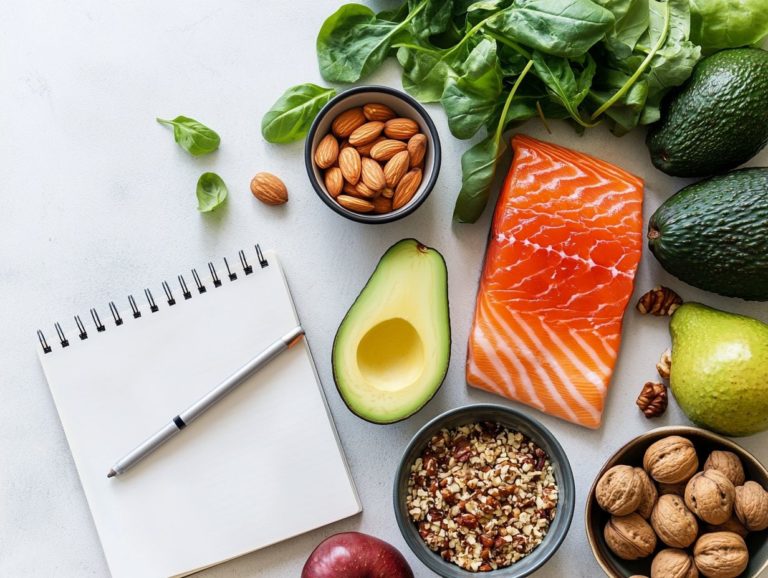How to Break a Keto Stall: Common Questions
Encountering a keto stall can indeed be exasperating, particularly when you re fully dedicated to a low-carb lifestyle. A keto stall occurs when your weight loss comes to a halt, despite your diligent adherence to the diet. Factors such as carbohydrate intake, calorie consumption, and stress levels often play a significant role in these stalls, along with potential food sensitivities and inflammation.
The duration of these stalls can vary, but there are effective strategies you can implement to break through them. Exploring the potential benefits of supplements might be worthwhile. Addressing potential dairy sensitivity or reducing alcohol consumption might also be helpful. Monitoring your macros and nutrient absorption, along with portion control, can also aid your progress.
It’s time to regain the momentum on your keto journey! Get ready to take charge of your keto journey and watch the pounds drop!
Contents
Key Takeaways:

- Consuming too many carbs, not eating enough calories, lack of sleep, and stress can all contribute to a keto stall.
- To break a keto stall, try incorporating intermittent fasting, increasing fat intake, reducing carb intake, and incorporating high-intensity workouts.
- Supplements like MCT oil, exogenous ketones, and electrolytes may also help break a keto stall. Seek medical help if a stall lasts longer than 4-6 weeks.
What is a Keto Stall?
A keto stall, often called a keto plateau, happens when you find yourself hitting a frustrating pause in weight loss while sticking to your keto diet. It can be particularly disheartening after you ve seen those initial pounds melt away, only to experience a standstill in your progress.
To navigate this challenge, it s essential to grasp the underlying factors contributing to this stall. This understanding involves unraveling the intricate interactions between your metabolism, dietary fat intake, potential food sensitivities adverse reactions your body may have to certain foods that can affect your weight loss and broader weight management strategies. All of these play a significant role in your body composition and health markers.
Why Do Keto Stalls Happen?
Keto stalls can arise from a multitude of factors that disrupt your natural weight loss journey, such as insulin resistance and hormonal imbalances that might stem from stress or emotional eating patterns.
As you embark on a low-carb diet, your body typically enters a state of ketosis, where it efficiently burns fat for energy instead of carbohydrates. However, various underlying issues can impede this metabolic state, resulting in stalled weight loss.
Grasping these factors is crucial for you if you aim to maintain your progress and navigate the emotional hurdles that often accompany dietary setbacks. Recognizing non-scale victories and weight stability can also provide motivation.
1. Consuming Too Many Carbs
One of the main reasons you might find yourself facing a keto stall is the consumption of too many carbohydrates, which can disrupt the delicate balance needed to maintain ketosis on the keto diet. Even those sneaky hidden carbs lurking in seemingly innocent foods can sabotage your weight loss efforts by elevating insulin levels, prompting your body to store fat instead of burning it. It’s crucial for you to keep a close eye on your carbohydrate intake to ensure you stay within the recommended limits for effective weight loss and maintain the metabolic state that delivers the intended benefits of a low-carb approach.
Tracking your carbohydrates does more than help you stay under your daily limits; it also sharpens your awareness of the foods entering your mouth. When your carbohydrate intake is too high, it can lead to insulin spikes and glucose fluctuations that undermine your body s fat-burning potential.
Grasping the difference between net carbs and total carbs can be a game changer for your progress. By maintaining a detailed food diary or using apps specifically designed for keto tracking, you can manage your intake more effectively and steer clear of common pitfalls. Staying consistently vigilant about your carbohydrate consumption is key to unlocking the full advantages of ketosis and achieving sustainable weight loss.
2. Not Eating Enough Calories
Not consuming enough calories can be counterproductive for you while following a keto diet, as it may lead to a sluggish metabolism and hinder your weight loss goals.
While creating an energy deficit is essential for shedding those extra pounds, excessively low calorie intake can trigger your body’s survival mechanisms, resulting in muscle preservation and a lower metabolic rate. It s crucial for you to strike a balance between cutting calories and maintaining adequate protein intake to support your weight loss goals and overall health.
This balance becomes even more critical on a keto diet, where macronutrient ratios play a pivotal role in achieving effective results. Insufficient calorie consumption can not only stall your progress but may also lead to unwanted fatigue and nutrient deficiencies, making it harder for you to stick to your dietary plans.
By focusing on a well-rounded macro approach that includes sufficient protein, healthy fats, and a limited amount of carbohydrates, you can enhance your metabolism and promote muscle retention while aiming for weight loss.
Ultimately, maintaining a moderate energy deficit while ensuring that your body receives the fuel it needs is vital for achieving sustainable and healthy weight loss. Manage your hunger cues and practice portion control.
3. Not Getting Enough Sleep
Inadequate sleep can significantly hinder your weight loss goals on a keto diet by elevating cortisol levels and disrupting your hormonal balance, both of which play essential roles in appetite regulation and fat storage.
When you’re sleep-deprived, you may find yourself indulging in emotional eating, making it increasingly difficult to adhere to your dietary goals.
If you’re on a ketogenic journey, prioritizing quality rest is vital not just for your physical recovery but also for effective weight management and achieving your desired health markers.
When your sleep is compromised, your body’s natural rhythm gets thrown off, leading to an imbalance in hormones like ghrelin and leptin that control hunger and satiety.
Elevated cortisol levels can cause cravings for high-carb comfort foods, which directly contradict the principles of a keto diet. By ensuring you get sufficient sleep, you can lower stress hormones and foster a more stable emotional state, reducing the temptation to overeat. This will help in better weight maintenance and stability.
Embracing healthy sleep habits is the secret weapon in your quest for a successful ketogenic lifestyle and your long-term weight loss aspirations!
4. Stress and Hormonal Imbalances

Stress and hormonal imbalances play a significant role in those frustrating keto stalls you might be experiencing. When stress levels rise, so do cortisol, insulin, and inflammation, which can throw a wrench in your weight loss efforts.
Chronic stress can trigger emotional habits that lead to overeating or making less-than-ideal food choices, complicating your commitment to a low-carb diet. Recognizing the importance of stress management techniques, like mindfulness and relaxation, is crucial for anyone striving to maintain their keto lifestyle and reach their weight loss goals.
Understanding how stress influences hormonal fluctuations is vital for your successful weight loss journey. Elevated cortisol, often dubbed the ‘stress hormone,’ can boost your appetite and cravings for high-sugar and high-carb foods, making it even harder to stick to your nutritional targets.
This cycle of stress and unhealthy eating can result in stubborn weight gain, particularly around the abdomen. By incorporating strategies such as deep-breathing exercises, yoga, and cognitive behavioral therapy, you can effectively reduce stress levels, support hormone balance, and encourage healthier eating habits.
Ultimately, managing stress not only helps you stay on track with your keto diet but also enhances your overall emotional well-being. It s essential to remember that achieving weight loss success is just as much about mental health as it is about diet.
How Long Do Keto Stalls Last?
The duration of a keto stall can differ significantly from person to person. Some might find themselves at a plateau for just a few days, while others could be stalled for weeks or even months. Factors like body composition, metabolic rate, food sensitivities, and your commitment to the ketogenic lifestyle all influence how long you may experience this stall in weight loss.
Understanding these elements is essential as you navigate your keto journey and look for effective strategies to break through those frustrating plateaus.
Hormonal changes, stress levels, and sleep patterns can have a substantial impact on how your body responds to a ketogenic diet. These factors can affect the length of stalls. For example, high cortisol levels from stress can hinder fat loss, while a lack of sleep can disrupt how your body processes food, leading to more stalls.
Changes in your nutrient intake like variations in the ratio of fat to protein and nutrient absorption can also contribute to the plateau.
Recognizing these factors can help you jumpstart your fat loss! By making informed adjustments, you can get back on track and maintain a sustainable keto lifestyle. Incorporating high-intensity exercise and fasting can also be beneficial.
How to Break a Keto Stall?
To break a keto stall, consider addressing factors like hidden carbs and emotional eating. Monitoring your dietary recommendations and making adjustments in your keto food list can also be crucial. Always remember to focus on your overall health improvements and weight maintenance.
Breaking a keto stall requires you to implement strategic modifications to your dietary and lifestyle habits. This will reignite your weight loss efforts and help you overcome those frustrating plateaus.
This might involve adjusting your nutrient ratios, incorporating intermittent fasting, increasing the intensity of your workouts, and making smart food choices today to see results!
By gaining insight into the factors contributing to the stall, including food sensitivities and insulin resistance (the body’s reduced ability to respond to insulin), and exploring various strategies, you can effectively navigate your weight loss journey and achieve sustainable results.
1. Try Intermittent Fasting
Intermittent fasting serves as a powerful ally in breaking through a keto stall. It creates a notable energy deficit while lowering insulin levels to facilitate fat burning. This approach involves cycling between periods of eating and fasting, enhancing your metabolic flexibility and amplifying your weight loss efforts, all while closely monitoring your caloric intake and portion control.
Many who embrace intermittent fasting within their keto lifestyle discover that it not only helps them overcome plateaus but also fosters better regulation of hunger cues and emotional relationships with food.
By naturally lowering insulin levels, intermittent fasting enables your body to transition into a fat-burning state with greater efficiency. This synergistic effect not only optimizes ketone production and nutrient absorption but also encourages the utilization of stored fat as fuel.
As this transformative process unfolds, you may notice an increase in mental clarity and sustained energy throughout the day. This makes it easier to adhere to the principles of both intermittent fasting and the keto diet.
This method can also simplify your meal planning, reducing the mental clutter associated with food choices and nurturing a more mindful approach to nutrition. This includes better management of emotional eating and unhealthy cravings.
2. Increase Your Fat Intake
Increasing your dietary fat intake can be a powerful strategy for overcoming a keto stall. It keeps your body firmly in ketosis, allowing you to optimally utilize fat for energy. By emphasizing healthy fats, you can enjoy non-scale victories like enhanced energy levels and greater satisfaction with your meals. This can significantly boost your adherence to a ketogenic diet and stabilize your body weight.
However, it’s vital to monitor your fat sources to ensure they align with the principles of the keto lifestyle for the best results.
Incorporating sources such as avocados, olive oil, nuts, and seeds not only adds delightful flavor but also provides essential nutrients. Take avocados, for example they’re packed with monounsaturated fats and potassium, promoting heart health and helping maintain electrolyte balance. Olive oil, on the other hand, is lauded for its anti-inflammatory properties, supporting your metabolic health and improving health markers like blood pressure and glucose levels.
By prioritizing these wholesome fats, you can enhance your nutrient intake and amplify your sense of fullness. This effectively curbs cravings and paves the way for a more successful weight loss journey. Consuming fatty fish like salmon provides Omega-3 fatty acids, which are vital for brain function and can further boost your mood as you navigate your low-carb lifestyle and manage protein intake efficiently.
3. Reduce Your Carb Intake
Reducing your carb intake is essential if you’re experiencing a keto stall. It helps you maintain your body s state of ketosis and supports continued weight loss. You might be consuming hidden carbs or comfort foods without realizing it, which can spike your insulin levels and directly impact your ability to burn fat.
By diligently monitoring and minimizing your carbohydrate consumption, you can optimize your keto diet and foster a more favorable response from your body.
Being aware of where these hidden carbs tend to hide is crucial for your success on this ketogenic journey. Common offenders include sauces, dressings, and certain beverages, which often sneak in sugar or starches that can derail your progress.
Processed foods are particularly notorious for disguising sugars under various labels, so it s vital for you to scrutinize ingredient lists carefully. Even seemingly healthy foods, like certain fruits and vegetables, can contribute unexpected carbs when not consumed in moderation. Additionally, be wary of dairy sensitivity as it could impact your overall carbohydrate intake.
By adopting a more vigilant approach to carbohydrate sources, including portion control, you can sustain ketosis, enhance fat oxidation, and effectively bolster your weight management efforts.
4. Incorporate High-Intensity Workouts

Incorporating high-intensity workouts can significantly help you break through a keto stall. These workouts are effective at burning calories, preserving muscle mass, and enhancing your overall metabolic rate. Not only do they promote fat loss, but they also improve cardiovascular health and body composition. Regularly engaging in high-intensity workouts can even provide you with psychological benefits, making it easier to stick to your dietary goals and manage your emotional habits and stress levels.
The synergy between a ketogenic diet and high-intensity exercise can amplify the benefits you experience during your weight loss journey. As you improve your fitness levels, you ll likely notice an increased efficiency in utilizing fat as fuel, which is essential for anyone following a low-carb lifestyle. This type of exercise not only enhances your ability to maintain lean muscle mass crucial for a healthy metabolism but also fosters a more resilient metabolic state.
By incorporating these workouts into your routine, you’ll likely experience a boost in energy, increased endurance, and a heightened sense of accomplishment. All of these factors can intensify your motivation and encourage a sustainable commitment to your weight loss journey, supporting muscle preservation and improving overall body composition.
Start incorporating these tips today and witness the transformation in your ketogenic journey!
5. Take a Break from Dairy
Taking a break from dairy products can be a game-changer if you’re hitting a keto stall, especially if you suspect sensitivities that might spark inflammation and sabotage your weight loss efforts. Many people include dairy in their ketogenic diets, but you may discover it’s holding you back due to hidden carbs or personal food sensitivities, including dairy sensitivity.
By temporarily cutting out dairy and paying attention to any shifts in your body composition and weight, you can gain invaluable insights into your dietary needs and fine-tune your keto lifestyle.
During this period of abstinence, it’s crucial to keep a close eye on your body for any signs of inflammation or discomfort that you might not have noticed before. Research shows that folks react differently to dairy; some may experience bloating or digestive issues that could impact their weight loss journey and weight maintenance.
The relationship between dairy and insulin sensitivity is intricate, underscoring the importance of tailoring your dietary choices based on how your body responds.
By diligently tracking your reactions to various food groups, including common culprits like alcohol consumption, you can create a personalized plan that maximizes fat loss while minimizing inflammation, ultimately paving the way for more successful outcomes on your keto journey.
6. Get Enough Sleep and Manage Stress
Getting enough sleep and managing your stress levels are essential for successfully breaking through a keto stall and reaching your weight loss goals. When sleep quality suffers and stress runs high, cortisol levels can spike, adversely affecting the hormones that regulate appetite and metabolism. Prioritizing restful sleep and incorporating stress management techniques can create an environment that supports weight loss and enhances your health while embracing the keto lifestyle, contributing to better weight stability and overall well-being.
Sleep isn’t just a chance to recharge; it plays a crucial role in regulating hormones like leptin and ghrelin. Leptin signals fullness, while ghrelin signals hunger. When your body endures prolonged stress and inadequate rest, it can spark unhealthy cravings and throw these hormones out of balance, making it significantly harder to stick to your keto diet and achieve sustainable weight maintenance.
Adopting effective stress management strategies, such as mindfulness practices or regular physical activity, can help restore hormonal equilibrium and improve insulin sensitivity both vital for maximizing the benefits of the ketogenic approach. As you address these factors, you’ll likely find that it aids weight loss and elevates your overall well-being and energy levels. Experience the transformation that quality sleep can bring to your weight loss journey!
Don’t wait! Start prioritizing your sleep and stress management today to see the results you desire.
Using Supplements to Overcome a Keto Stall
Supplements can serve as valuable allies in overcoming a keto stall, offering essential nutrients and compounds that may boost fat metabolism and enhance your overall weight loss efforts, helping you maintain optimal metabolic health.
MCT oil and exogenous ketones are particularly favored by keto enthusiasts, as they can effectively elevate your ketone levels and promote a deeper state of ketosis, supporting your dietary fat and protein intake goals.
Consider electrolyte supplementation to address any potential deficiencies that may arise from a low-carb diet, ensuring you maintain optimal performance and recovery throughout your weight loss journey. This is crucial in managing health improvements and preventing fluctuations in your energy levels and body weight.
Unlocking Energy with MCT Oil
MCT oil, or medium-chain triglyceride oil, is a highly regarded supplement for those following a keto diet. It swiftly converts into energy and enhances fat metabolism. MCT oil increases ketone production. This supports your weight loss and offers quick fuel for both physical and mental activities. Incorporating MCT oil into your diet can effectively break through any keto stalls or potential keto plateaus you may encounter.
What sets MCT oil apart from long-chain triglycerides are its unique properties. Unlike other fats, MCT oil bypasses the traditional digestion process, allowing for faster absorption and utilization by the liver. This leads to an immediate boost in your energy levels, which is especially beneficial during workouts or daily tasks, enhancing your metabolism.
Enhanced fat oxidation promotes a sense of fullness, helping you control your appetite and reduce overall calorie intake and hunger cues perfectly aligning with your goals on the ketogenic journey.
Exogenous Ketones
Exogenous ketones are supplements expertly crafted to elevate your ketone levels, especially useful when you hit a keto stall. By providing an external source of ketones, these supplements can help you transition smoothly into ketosis and boost your energy levels, making it easier to adhere to a low-carb diet. Many individuals discover that exogenous ketones not only support their weight loss but also enhance cognitive function throughout their ketogenic journey.
Available in both liquid and powdered forms, these ketones are quickly absorbed by your body, offering an immediate source of fuel. This rapid availability is essential for maintaining your energy, particularly during the early stages of a ketogenic diet when your body adjusts to using fat instead of carbohydrates for fuel, helping to manage weight fluctuations.
You ll love how exogenous ketones curb cravings, making your dietary journey smoother! To fully reap the benefits of these supplements, consider using them strategically perhaps before a workout or as part of a well-structured meal plan, ensuring you balance your macros correctly.
Additionally, pairing these supplements with proper hydration and a balanced intake of electrolytes can further enhance their effectiveness, supporting sustainable weight loss in a way that feels manageable and rewarding, contributing to better body composition.
Electrolyte Supplements

Electrolyte supplements are vital for anyone on a keto diet, especially when you’re breaking through a stall. They play a crucial role in maintaining proper hydration and supporting muscle function. As you transition into ketosis, you may experience electrolyte imbalances that can lead to unwelcome symptoms like muscle cramps and fatigue, impacting your exercise and protein intake.
These imbalances often arise from decreased insulin levels, causing your kidneys to excrete more sodium and potassium. This can leave you feeling weak and lethargic, ultimately hindering your weight loss efforts. That’s why it s essential for you to prioritize your electrolyte intake while following a ketogenic lifestyle and monitoring your calories.
By incorporating supplements like magnesium, potassium, and sodium, you can alleviate those pesky symptoms and boost your energy levels. This makes it far easier to stay active and motivated, ensuring better weight management.
Recognizing the signs of imbalance and taking proactive measures can be your secret weapon in unlocking continued progress and achieving your desired health outcomes, leading to significant health improvements.
Start incorporating these supplements today for a more energetic and fulfilling ketogenic journey!
When Should I Seek Medical Help for a Keto Stall?
Seeking medical help for a keto stall is a wise choice when your weight loss plateaus linger beyond a reasonable timeframe. This is especially true if you’re experiencing concerning symptoms like fatigue, mood swings, or significant shifts in your health markers. If you have insulin resistance or any pre-existing health conditions, talking to a healthcare professional can give you personalized advice that suits your unique needs.
Knowing when to seek assistance is vital for maintaining your overall wellbeing while following a keto diet, which is a diet low in carbs and high in fats, and recognizing non-scale victories achievements outside of weight loss, like increased energy or better mood.
Keto stalls can signal serious issues, so it’s crucial to pay attention! They may indicate underlying metabolic imbalances or nutritional deficiencies that require professional evaluation. Persistent cravings, digestive disturbances, or changes in your sleep patterns can also be red flags indicating the need for medical intervention. Food sensitivities or dairy sensitivity may also contribute.
In such situations, a healthcare provider can analyze your dietary habits, suggest necessary adjustments, or perform tests to rule out issues like thyroid dysfunction or adrenal fatigue. A comprehensive approach, including professional support, can help you navigate the complexities of a keto diet and pave the way for sustainable health improvements, considering factors like carbohydrate intake and portion control.
Frequently Asked Questions
What is a keto stall and how can it affect my weight loss journey?
A keto stall refers to a plateau in weight loss that occurs while following a ketogenic diet. It can be frustrating, but it’s a natural part of the process as your body adjusts to burning fat for fuel. Understanding how to break a keto stall can help you continue to see progress in your weight loss journey.
Why does a keto stall occur?
A keto stall can occur for a variety of reasons, including changes in your body’s hormones, decreased activity levels, and your body adjusting to a lower calorie intake. It’s also possible that you may have reached a weight loss plateau, where your body has adapted to the ketogenic diet and is no longer as responsive to it. Other factors like hidden carbs and emotional eating can also contribute to a stall.
How can I break a keto stall?
Breaking a keto stall involves making some changes to your diet and lifestyle. You can try:
- Increasing your physical activity
- Reducing your calorie intake
- Implementing intermittent fasting
- Reducing your intake of dairy or nuts
- Incorporating more high-fiber foods into your meals
- Adjusting your protein intake and fat intake
- Considering high-intensity exercise
Is it normal to experience a keto stall more than once?
Yes, it is normal to experience multiple keto stalls throughout your weight loss journey. As your body continues to adapt and change, you may hit plateaus at various points. The key is to stay consistent with your diet and lifestyle changes and be patient as your body adjusts. Tracking non-scale victories can help you stay motivated during these times.
Are there any supplements or foods that can help break a keto stall?
While there’s no magic pill, you can try MCT oil, supplements that provide ketones from outside the body, and even spices like cinnamon and ginger to potentially break that stall. These are not guaranteed to work, so combine them with other methods. Sticking to a strict keto food list can also be beneficial.
How long does a keto stall typically last?
The length of a keto stall can vary from person to person. Some may only experience a stall for a few days, while others may struggle for several weeks.
Patience is key! Continue to make healthy choices, even if you’re not seeing immediate results. If you’ve been stuck for weeks, it s time to take action! Consult a healthcare professional who understands food sensitivities and emotional habits to get back on track.






